NORTH WALES COAST RAILWAY:NOTICE
BOARD
Rheilffordd arfordir gogledd Cymru: Hysbysfwrdd
11 June 2012
 Last issue
Last issue Archive
Archive Share this issue:
Tweet
Contributions and comments are encouraged: see the Contributions Page
This site is dedicated to all our regular contributors and supporters, and especially the rail staff of North Wales.
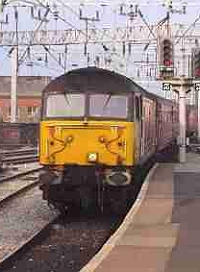
Forthcoming events
June 2012
Saturday 16 June Excursion to North Wales Scottish Railway Preservation Society From Glenrothes with Thornton, Kirkcaldy, Dalgety Bay, Edinburgh Waverley, Kirknewton over Beattock and Shap summits to Chester and Llandudno. (diesel-hauled)
Saturday 16 June Excursion Cheshire Cat Tours Whitchurch, Wem, Shrewbury, Wellington, Telford Central, Codsall, Wolverhampton, Tame Bridge Parkway, Birmingham International to Canterbury.
Sat / Sun 23 - 24 June Llangollen Railway Heritage Railcar Gala
Sat / Sun 23 - 24 June Welsh Highland Heritage Railway Slate industrial exhibition
Saturday 30 June Excursion to North Wales Compass Tours 'Snowdon Mountain Ranger' Skipton, Keighley, Shipley, Wakefield Kirkgate, Huddersfield, Denton, Stockport, Altrincham & Knutsford to Betws-Y-Coed & Blaenau Ffestiniog
July 2012
Saturday 7 July Excursion to North Wales UK Railtours 'Chester and the Pennines' Stevenage, Potters Bar, Finsbury Park to Chester (break) and then through Wigan, Blackburn and Accrington to Copy Pit Summit, Hebden Bridge and Mytholmroyd before descending to Wakefield and finally joining the East Coast Main Line to head homeward.
Sunday 22 July Steam in North Wales Railway Touring Company 'North Wales Coast Express' Crewe, Wilmslow, Stockport, Manchester Piccadilly, Frodsham and Chester to Llandudno, Llandudno Junction, Bangor and Holyhead (arr 15:10 dep 17:45).
Sat / Sun 28 - 29 July Llangollen Railway 1960s weekend
Sunday 29 July Steam in North Wales Railway Touring Company 'North Wales Coast Express' Liverpool Lime Street, Broad Green, Warrington Bank Quay, Frodsham and Chester to Llandudno, Llandudno Junction, Bangor and Holyhead (arr 14:30 dep 16:30).
Tuesday 31 July Steam in North Wales Railway Touring Company 'The Welsh Mountaineer' Preston, Warrington Frodsham, Chester to Llandudno Junction and Blaenau Ffestiniog (arr. 13:15 dep 16:10)
[Note: again this summer there will be no steam trains on the Cambrian Coast line due to the rail industry's continuing inability to adapt the new ERTMS signalling for use with a steam locomotive.]
August 2012
Sunday 5 August Steam in North Wales Railway Touring Company 'North Wales Coast Express' Crewe, Wilmslow, Stockport, Manchester Piccadilly, Frodsham and Chester to Llandudno, Llandudno Junction, Bangor and Holyhead (arr 15:10 dep 17:45).
Sunday 12 August Steam in North Wales Railway Touring Company 'North Wales Coast Express' Crewe, Wilmslow, Stockport, Manchester Piccadilly, Frodsham and Chester to Llandudno, Llandudno Junction, Bangor and Holyhead (arr 15:10 dep 17:45).
Tuesday 14 August Steam in North Wales Railway Touring Company 'The Welsh Mountaineer' Preston, Warrington Frodsham, Chester to Llandudno Junction and Blaenau Ffestiniog (arr. 13:15 dep 16:10)
Saturday 18 August Steam in North Wales Vintage Trains 'The Welsh Dragon' Tyseley - Blaenau Ffestiniog (Steam loco 5043 as far as Llandudno Junction; Class 47 diesel to Blaenau)
Sunday 19 August Steam in North Wales Railway Touring Company 'North Wales Coast Express' Liverpool Lime Street, Broad Green, Warrington Bank Quay, Frodsham and Chester to Llandudno, Llandudno Junction, Bangor and Holyhead (arr 14:30 dep 16:30).
Sat / Sun 25 - 26 August Llangollen Railway Classic Transport weekend
Sunday 26 August Steam in North Wales Railway Touring Company 'North Wales Coast Express' Liverpool Lime Street, Broad Green, Warrington Bank Quay, Frodsham and Chester to Llandudno, Llandudno Junction, Bangor and Holyhead (arr 14:30 dep 16:30).
Tuesday 28 August Steam in North Wales Railway Touring Company 'The Welsh Mountaineer' Preston, Warrington Frodsham, Chester to Llandudno Junction and Blaenau Ffestiniog (arr. 13:15 dep 16:10)
Saturday 31 August - 2 September Llangollen Railway Autumn Steam Gala
September 2012
Sun / Mon 1 - 2 September Llangollen Railway Autumn Steam Gala (continued)
Saturday 15 September Excursion Cheshire Cat Tours Aberystwyth - and stations to Crewe - to Carlisle.
Saturday 22 September Llangollen Railway Diesel Day
October 2012
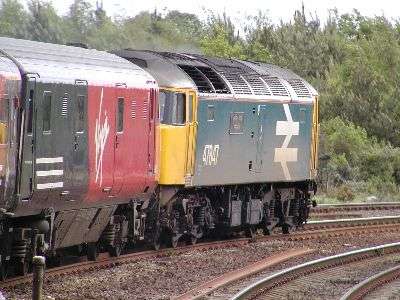
47 847 Railway World Magazine approaches Chester with the 09:19 Holyhead - Crewe, 22 May 2002. (Alan Crawshaw)
Note: the next update will appear later than usual, on 20 June.
A busy summer, with the Queen's Jubilee and a major sporting event taking place in England - yes, it was 2002! As a holiday relief, we've dug out some archives from that time and re-written them as history. At the beginning of 2001, the last of the Class 37-hauled trains which had inspired the creation of this website had run, but as it turned out, this was not the end of locomotive haulage on the North Wales Coast. Now read on...
FNW loco haulage returns - May 2002
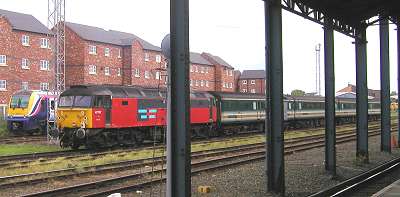
The much talked-about return of locomotive haulage to First
North Western
Birmingham - Holyhead trains, with the new Class 175s proving
unreliable, went ahead in Summer 2002. The new era began with the
arrival of nine First Great Western coaches as empty train 5Z12
Old
Oak Common - Wembley - Chester on 27 May. The train dropped off five
coaches
at Crewe and brought the remaining four forward to Chester. The loco
left
with the stock for staff training in the yard was 47 757 Restitution.
The
stock
"lent"
to
FNW was : Mk2E First opens 3261 & 3520; Mk2D
Standard
Opens 6200, 6202, 6206, 6221 & Brake Standard Open 9480. Mk2E BSO
9501. At the time, both companies involved were part of FirstGroup.
All the coaches were in FGW green and ivory livery and initially 9480, 6202, 6206 & 6213 were at Chester for training along with a class 47, as shown in our pictures. Some of the coaches still carried FGW window labels for 'Paddington' and 'Exeter St Davids.' All were built in the early 1970s and all had air conditioning. The 62xx vehicles started life as first class coaches, but had been re-fitted at some time with standard class seating. The first class vehicles were included because they were all that FGW could spare; in FNW use they were available for standard class passengers. 3520 was actually a 'Pantry First Open' having had some of seats removed to create a 'pantry' in which a catering trolley could be installed; this vehicle was not planned to be used in service unless another had to be taken out for repair.
A non-public test run was planned for Thursday afternoon 30
May, Chester
to Holyhead and back, and another on Friday 31 May from Chester to
Holyhead
and then back to Crewe. The first service train was to be the 22:15
Crewe
- Holyhead on Sunday 2 June, followed by the 06:30 Holyhead -
Birmingham
on Jubilee Monday [That was a special holiday for the Queen's 50th
year] and into the diagrams as below:
Mondays - Saturdays
06.30 Holyhead - Birmingham NS
10.07 Birmingham NS - Holyhead
14.02 Holyhead - Birmingham NS
17.34 Birmingham NS - Holyhead
Trains ran over the Aston line between Wolverhampton and Birmingham in one direction to reverse the train without a run-round. On Saturdays from 20 July this was not possible due to engineering work, so the train ran between Holyhead and Crewe only.
Sundays
16.56 Holyhead - Crewe
22.15 Crewe - Holyhead
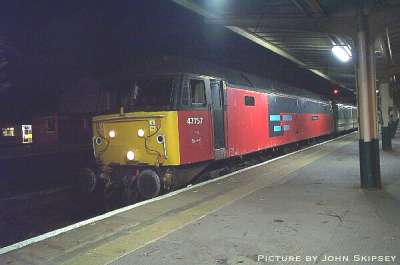
The introduction of the Class 47s went according to plan, only to be fouled up by events totally outside First North Western's control. The first public train was indeed 1D70 22:15 Crewe - Holyhead on Sunday 2 June, which ran as intended with 47 757 Restitution (an apt name, perhaps, although Restored might have been better) and coaches 9501 + 6221 + 6200 + 3520. John Skipsey's picture above shows the train at Chester. It was reported by a poeticall- minded insider that the passenger complement included '25 Yanks and about the same amount of Cranks.'
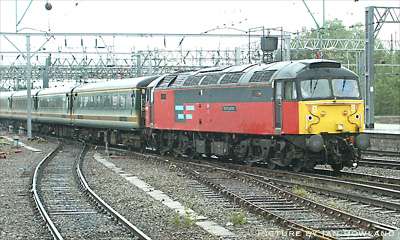
The next day, Holiday Monday 3 June, 757 began its day at Holyhead with the 06:30 to Birmingham, and Ian Bowland was up and about on the wet morning to record this train at Crewe (above.)
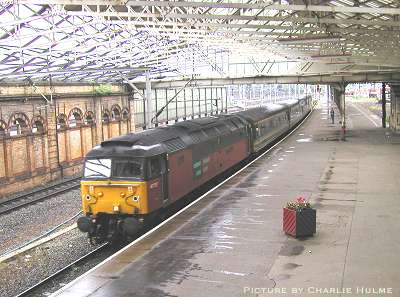
The train returned as 1D67 10:07 Birmingham - Holyhead, seen above arriving at Crewe (Charlie Hulme)
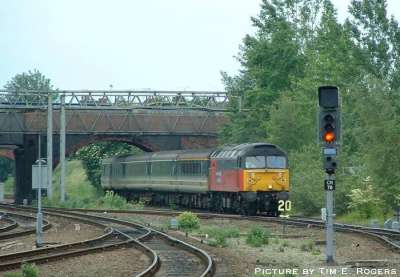
... and approaching Chester (Tim Rogers) - the four coaches were very well filled at this stage.
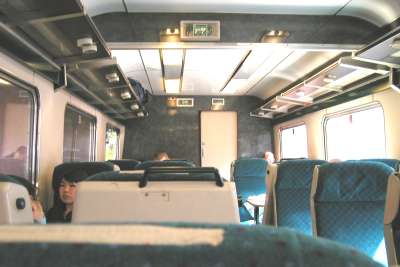
A glimpse inside one of the standard class First Great Western coaches: seats mostly in so-called 'airline' format but with plenty of leg room, although a few seats had no window view at all. Your compiler's first encounter with these vehicles was not entirely a happy one, as I accidentally brushed against one of the seat headrests, which promptly fell off ... the interiors are pleasant but are rather spoiled by the ingrained dirt in the glass fibre seat shells, which creates a scruffy ambience but appears to be impossible to clean.
While all this was going on, things elsewhere were already going pear-shaped as the 09:19 Holyhead - Euston Virgin train failed at Rugeley, causing a certain amount of chaos.
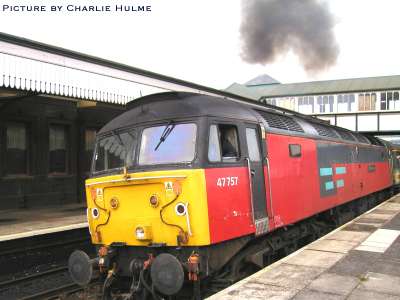
Here we are at Colwyn Bay, where after facing the problem (also found with Virgin services) of pushing open the wide coach door on the canted track, we proved that we are getting too old [10 years ago!] to run along platforms in time to photograph the locomotive departing; still, almost made it and probably gave the driver a laugh.
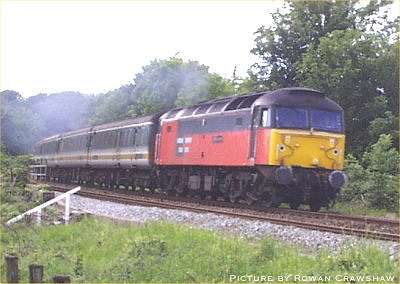
Next, the 14:02 Holyhead to Birmingham, pictured by Rowan Crawshaw passing Talybont near Bangor.
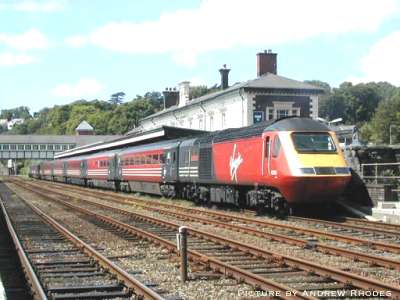
The afternoon Virgin service from Holyhead to London prepares to leave Bangor with 43 155 at the head. (Andrew Rhodes)
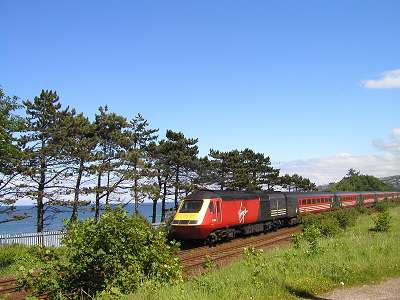
Back at Colwyn Bay, the afternoon Virgin to London was running a few minutes late as it pulled away from Colwyn Bay with 43 198 on the rear; this ran 16 minutes ahead of the 14:02 Holyhead - Birmingham the signalling arrangements on Anglesey are such that if this train is late leaving Holyhead the FNW loco-hauled train was sure to be delayed as well, and sure enough it was, but not for long, and we thought everything was going well in the sunshine...
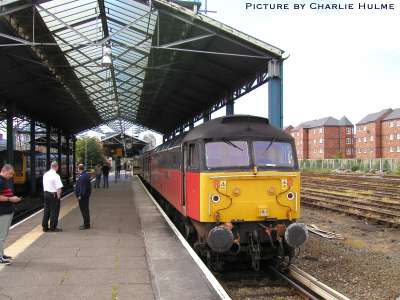
... and indeed it was until approaching Chester, word could be heard passing round the railfans on the train that there were problems ahead of us, and sure enough when we reached Chester the conductor told us that we could not leave due to signalling problems at Crewe, and that the Virgin train was stuck somewhere ahead of us. The crew and passengers stretched their legs on the platform (above) as we decided to avoid Crewe and return to Manchester aboard at Llandudno - Manchester 158. Apparently 47 757's train was terminated at Chester.
43 155/198 on 1A77 13:43 Holyhead - London were terminated at Crewe and were held to form 1D88 17:25 London - Holyhead which started at Crewe in place of the usual loco hauled set. The other West Coast HST on 14:41 Blackpool North - Euston (43 006/079) also terminated at Crewe and was then held to start 1D89 19:05 London - Holyhead from Crewe. Therefore both Virgin Trains at Holyhead overnight 3-4 June were HSTs.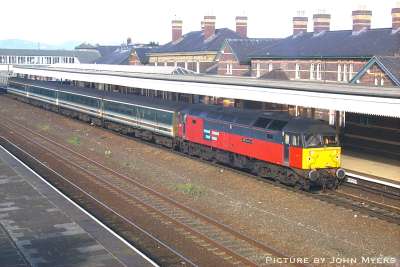
Rhyl on 4 June (John Myers).
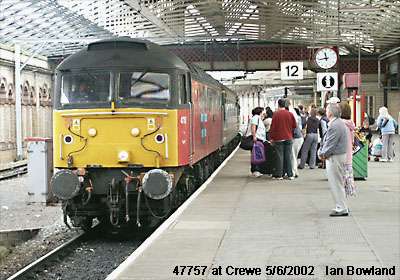
Wednesday 5 June, and Ian Bowland was at Crewe for the arrival of the 10:07 Birmingham - Holyhead, arriving in platform 12 announced as "running 27 minutes late due to a unit failure at Birmingham" according to the announcer. What actually happened was a points failure at Norton Bridge which delayed the 06:30 from Holyhead, and many other trains, by 30 minutes. By then out of course, it was further delayed in Birmingham area following local services and left New Street 35 minutes late.
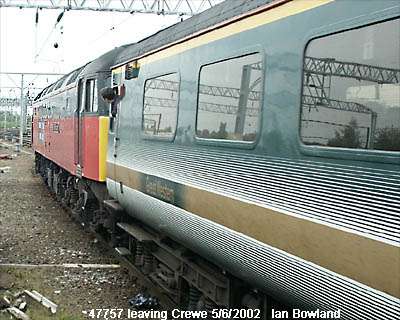
A good view of the curious vinyl decorations on the First Great Western coaches as the train pulls out of Crewe (Ian Bowland.)
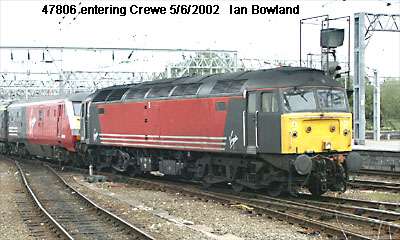
The Coast line's other loco-hauled train, the Virgin Trains 09:19 Holyhead - London, photographed on 5 June by Ian Bowland entering Crewe behind 47 806. It was reported that Virgin were planning to dispense with the last Class 47-hauled services on 19 August.
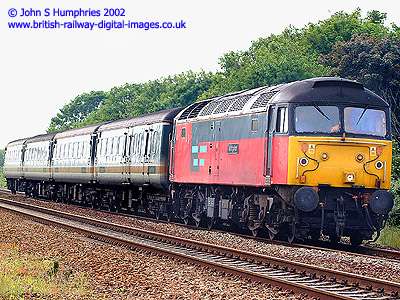
47 757 Restitution with 1G11 Holyhead -
Birmingham service
on 6 June, seen here approaching Prestatyn bang on time. (John
Humphries).
47 776 Respected made an appearance on the FNW
diagram on Friday 7 June, but its tenure did not last. While train 1G11
was between Stafford and Wolverhampton, a criminal threw an object at
the train which luckily only managed to crack the driver's windscreen
in the upper right corner. A delay ensued at Wolverhampton and a
British Transport Policeman arrived and talked to the driver.After a
lengthy wait the train carried on, via Bescot and then joined the main
again at Soho Depot. At Birmingham New Street the locomotive was run
round the train to allow it to be driven from the undamaged cab.
Saturday 8 June 2002
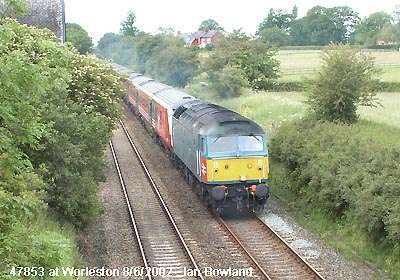
The Saturday timetable now had three Class 47s working
passenger trains
along the Coast as well as two HSTs, although one of the 47s worked
eastbound
only with the 09:19 Holyhead - London as far as Crewe. 8 June saw a
celebrity
on this turn in the form of XP64-liveried 47 853 Rail
Express, back
in service after a main generator repair. This picture shows the train
running late through Worleston (between Chester and Crewe) by Ian
Bowland. In 2012 this loco was sold to DRS, who are repainting it
in their house style.
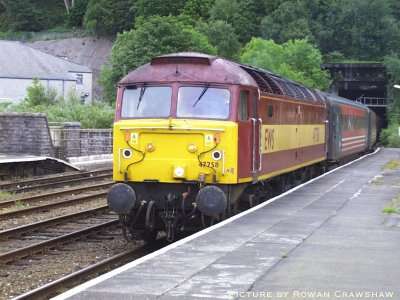
A Class 47/7 hired from EWS by Virgin was diagrammed for the 08:05 from London from Crewe to Holyhead and back as the 13:35 from Holyhead; this is 47 758 calling at Bangor with the westbound train on 8 June (Rowan Crawshaw).
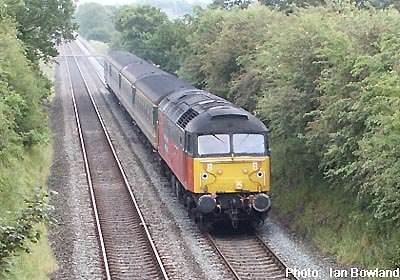
Then there were the two First North Western return workings from Holyhead to Birmingham and back; this is the 10:07 Birmingham - Holyhead at Worleston (picture by Ian Bowland) headed by 47 757 Restitution, back on the duty.
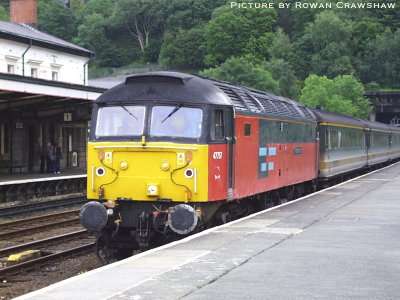
The same train at Bangor, 20 minutes down on the schedule. It was curious that two locos with consecutive numbers should be working two different companies' trains. (Rowan Crawshaw)
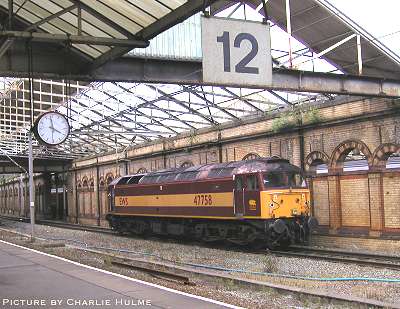
Later, at Crewe, 47 758 had been taken off the front
of the 13:35
from Holyhead and was running off to its next duty. The blackened state
of the loco's roof was evidence of a fire at Motherwell depot some
months earlier.
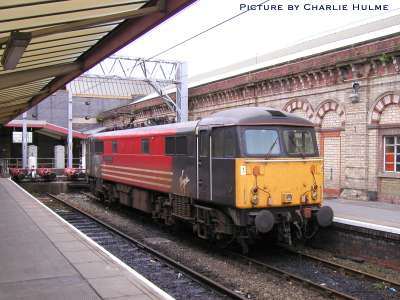
The train continued to London propelled from the rear by 87 024 Lord of the Isles which had been waiting in Platform 12.
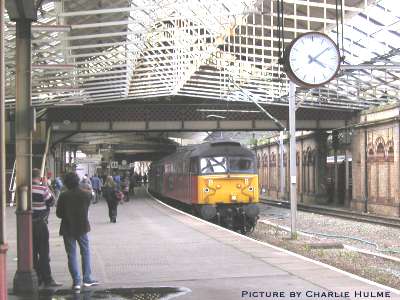
The 14:02 from Holyhead arrived, a few minutes late, at 16:10,
only to be further delayed by a family of latecomers trying to get a
4-foot
cuddly duck aboard the already-full train!
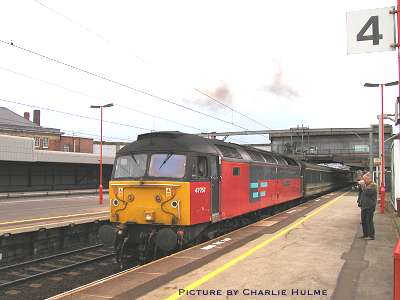
Departing from Stafford, with a fair number of railfans aboard.
Royal Visit
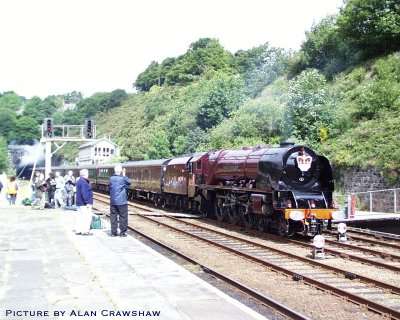
11 June 2002 was a special day for the North Wales coast line, as Queen Elizabeth II and Prince Philip chose rail as their preferred travel method for this section of her Jubilee tour of Britain, and someone had the inspired idea to use a steam loco to haul the train. 6233 Duchess of Sutherland was chosen for the honour. The locomotive and its support coach travelled to Holyhead the day before, followed during the night by the Royal Train itself. The rather complex schedule for the big day was:
Holyhead dep 09:36, Llanfair PG 10:00 / 10:10, Bangor 10:20 / 10:50, Holyhead 11:40 / 12:51, Bangor 13:41, Llandudno Jn 14:02 / 16:25, Holywell 17:05 / 17:17, Chester 17:42, Crewe 18:14.Alan Crawshaw was waiting as the train arrived at Bangor for the first time (above), having set down Her Majesty at Llanfairpwll.
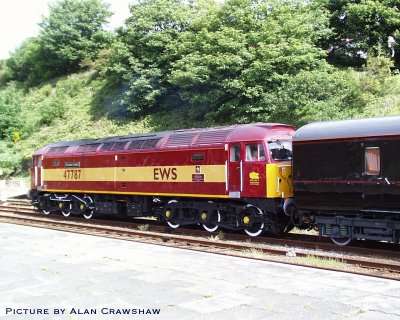
An immaculate 47 787 Windsor Castle was at the rear. This loco had recently been repainted and renamed to act as standby Royal loco for the Jubilee, and very good it looked to, a credit to all the staff involved.
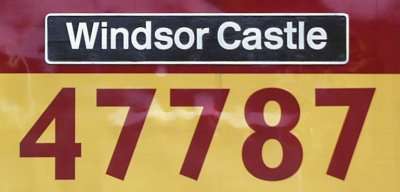
Here's a close up of 47 787's embellishments (Alan Crawshaw)
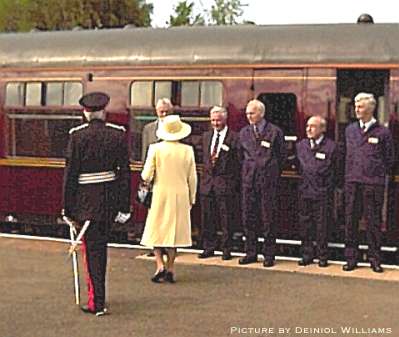
The Queen meets the train crew (Deiniol Williams).
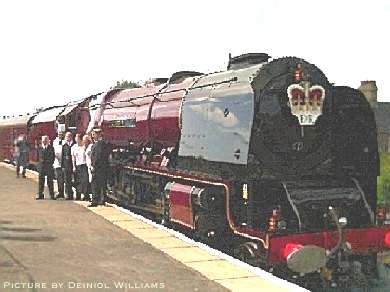
The Royal Train's on-board staff pose with the loco (Deiniol Williams).
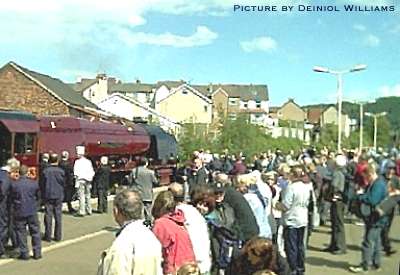
The crowds turned out in force and were allowed on the platform with no security problems, an informality which characterised the whole trip.
BBC TV stated that the last time the Queen rode behind steam was 1962, although the Duke of Edinburgh managed a last 'grice' in 1967. However, your compiler's wife recalls her excitement as a little girl waving her Welsh flag at the Royal Train as two Manor 4-6-0s hauled it through Criccieth in 1963. This was probably the last steam-hauled Royal Visit to Wales.
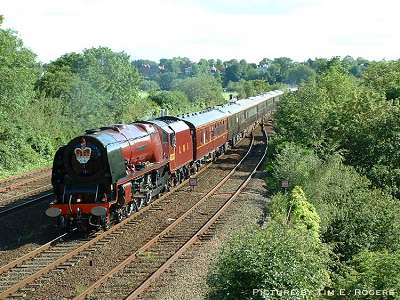
A classic view by Tim Rogers on the approach to Chester.
Club Trains
The First North Western loco-hauled diagram, which was reportedly objected to by Railtrack (remember them?) due to congestion caused by more trains in the Birmingham area, was modified for the Winter 2002-3 timetable to a Monday - Friday only commuter working between North Wales and Manchester.
This prompted the following historical survey which we published in October 2002.
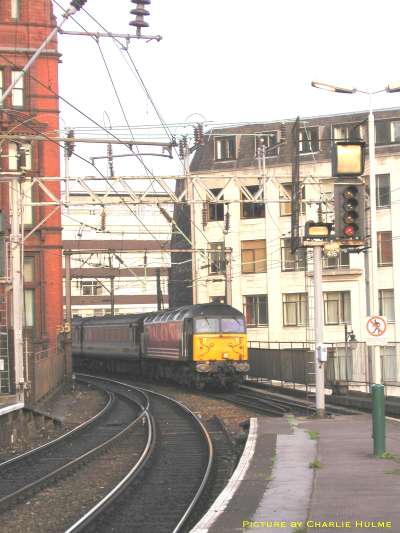
The Winter 2002-2003 First North Western timetable featured just two passenger trains hauled by diesel locomotives, namely the Mondays-Fridays 06:33 Bangor - Manchester Piccadilly and 17:19 Manchester Piccadilly - Holyhead. This train was inevitably being referred to by many as the 'Club Train' and as such seemed to be the last of a long tradition. Our picture above shows the evening train squeezing between the buildings into Manchester Oxford Road on 9 October 2002 with 47 750 in charge.
The concept of the Club Train had its origins around the turn of the 20th century, and the idea was aimed particularly at well to do business commuters who were travelling into Liverpool and Manchester. The travelling club, wherein each member had his own designated seat within a specially equipped saloon lasted until after the second world war. Saloons were converted from ordinary stock and perhaps the most interesting were the LMS conversions of first-class 12-wheel 'American Special' coaches, where the interiors were gutted except for toilets and arm chairs installed. Some elderly 'Picnic Saloons' were also converted in an attempt to attract the third-class traveller. The latter were eventually withdrawn between 1941-46, but does anyone know when the American Special Club Cars were withdrawn? After Nationalization, ordinary corridor stock was used until 1966. Class 150 Sprinters replaced older DMUs in the late 1980s and although any pretence of luxury had long since disappeared, indeed it even terminated at Chester at one period, the name 'Club Train' had entered folklore.
Double-chimney Black Five No. 44766 in unlined black worked the final steam-hauled train on 30 December 1966 before it went over to DMU operation. DMU's had been tried once before but a barrage of complaints led to the re-instatement of loco-hauled stock. Stock worked down from Chester each day to take up the diagram and Llandudno Junction men always ensured the locomotive was kept clean. In those days the train departed Llandudno at 07.40 and ran all-stations to Prestatyn. There would be a daily race between the 'club' and a Rhyl-Chester local as both departed Rhyl at the same time on what was then a four-track line. The 'Club train' returned from Manchester Exchange at 16.30.
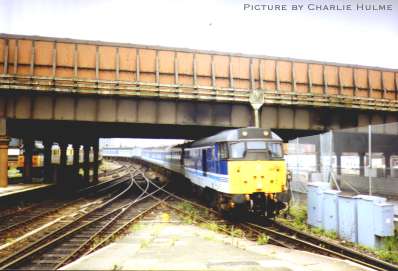
The pre-war Club Trains also worked into Manchester from other resorts for the well-heeled such as Windermere, Blackpool and Southport, and it was trains from the latter two that heralded what many saw as the revival of the concept by North West Regional Railways in the early 1990s.The old DMUs were mostly withdrawn, and it became obvious that the area did not have enough second-generation DMUs to cover all the peak-hour needs. Class 31/4 and 37/4 locos were allocated to these duties, also being available for infrastructure trains at weekends; the view above shows Manchester Victoria with a Class 31/4 freshly painted in Regional Railways colours arriving with empty stock.
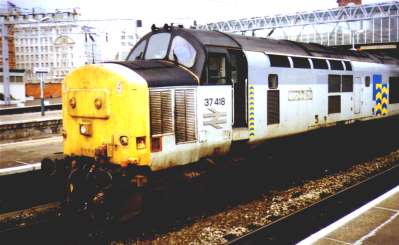
This picture shows Manchester Oxford Road in 1993 after the
Blackpool
and Southport trains had been transferred to run to and from
Piccadilly,
also calling at Oxford Road and Deansgate. The locomotive is 37 418,
still
carrying
Railfreight
petroleum
livery, but soon to be renamed East
Lancashire Railway and repainted in Regional Railways grey and
blue. Of
interest here is that the train in shown in platform 2, which is was
later
banned
for use by loco-hauled trains.
The locomotive and stock from the Blackpool train were for a time used to work the daytime 'Irish Mancunian' to Holyhead and back for ferry passengers. The 'club' trains (which were of course were nothing of the sort) eventually succumbed to DMU working, after at least one reprieve, and by the late 1990s all locomotive workings had been concentrated on North Wales.
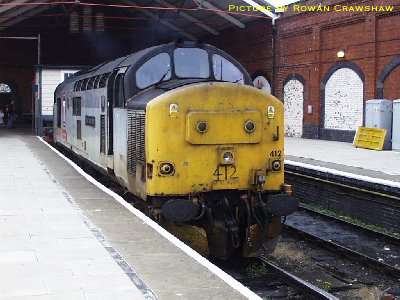
Few would have predicted that at the end of the decade, the Llandudno 'Club Train' would be reborn, but this is indeed what happened. Summer 2000, after the time when all North Wales First North Western loco-workings should have vanished, the 17:19 Manchester - Llandudno became a 37/4 working again, making use of the release crossover at Llandudno which had not been regularly used for years, and a shunter who came by van from Holyhead to assist. In the picture above 37 412 Driver John Elliott prepares to run over this crossover after working 1D45, 17:19 from Manchester on 7 July 2000...
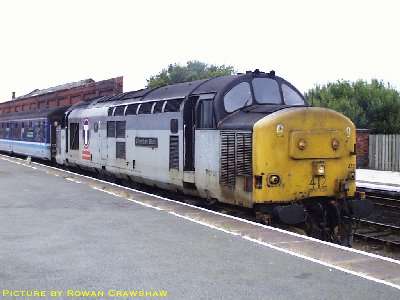
... and is seen ready to depart soon afterwards as 1H48 19:54 to Manchester.
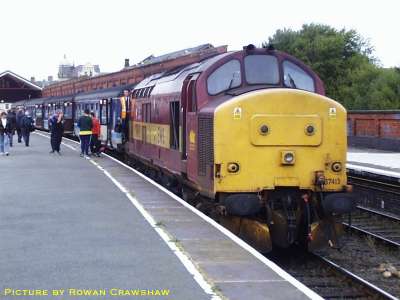
This train was immensely popular with railfans, who on most days made up the great majority of the passengers by the time of arrival at the terminus, most travelling back on the return train. Admirers can be seen milling about as 37 413 awaits departure at Llandudno for 1H48 19:54 to Manchester on 4 August 2000.
This diagram was:
1G95 06:29 Holyhead-Birmingham
1D67 10:07 Birmingham-Holyhead
1H42 13:21 Holyhead-Manchester (run round and stable at Longsight)
1D45 17:19 Manchester-Llandudno
1H48 19:54 Llandudno-Manchester
1D51 22:55 Manchester-Chester
Empty Chester-Crewe
This was a lot of work for any type of train, never mind a vintage 37/4 with 9000 engine-hours 'on the clock.'
When this working ended with the Summer 2000 timetable, and
especially when all 37/4 haulage on the Coast ended in January 2001,
that
seemed to be the end of the line for Club trains.
However, in Winter
2002, albeit Class 47-hauled, and serving Bangor and Holyhead, the
daily Manchester Club Train was re-born. This was due to continuing
problems with the new Class
175
units which should have all been in use for some years by then;
permission to return to locomotive working was granted by the Stretegic
Rail Authority.
The Monday - Friday train worked empty to Crewe after arrival in Manchester, and returned from there in the evening after servicing.
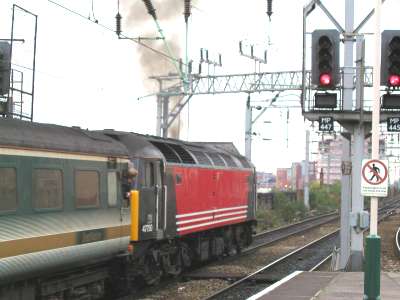
Complete with
obligatory
'basher' at the front coach window, 47 750 which still wore
Virgin livery, having previously been
hired to
Virgin Trains, powers out of Manchester Oxford
Road
on 10 October 2002. Not counting HST services, this was by that time
the
only
passenger departure of the day from Manchester Piccadilly worked by
a diesel locomotive, and even the electric locomotives usually pushed
from
the back. In 2012, of course, there are no scheduled loco-hauled
passenger trains of any sort on a normal day.
Postscript
Remarkably, from 31 March 2003, with no end to the Class 175
problems in sight, FNW returned loco-haulage to Birmingham as well as
the continuing Manchester train, with three Monday - Friday Class 47s
diagrams then in operation:
Diagram 1
06:48 Holyhead - Birmingham New Street
10:21 Birmingham - Holyhead
14:00 Holyhead - Birmingham
17:21 Birmingham - Holyhead
Diagram 2
1G76 01:50 (01:40 Mondays) Holyhead - Birmingham
1D57 05:21 Birmingham - Holyhead
1G96 08:52 Holyhead - Birmingham
1D71 12:21 Birmingham - Holyhead
1K73 15:49 Holyhead - Crewe
1D81 18:18 Crewe - Chester
Empty stock Chester - Holyhead (Not Fridays and Saturdays)
Diagram 3:
06:33 Bangor - Manchester Piccadilly
17:19 Manchester Piccadilly - Holyhead
This situation continued, with the interesting addition of a Sunday train from Holyhead made up of eight coaches, until the end of September 2003, when First North Western relinquished the North Wales services to Wales and Borders Trains, who in turn handed them over to newly-formed Arriva Trains Wales in December 2003. The number of diagrams was cut back, and the FGW coaches were replaced by ex-Virgin vehicles hired from Riviera Trains, until at the end of March 2004 the last 47-hauled turn, the Manchester service, ceased.
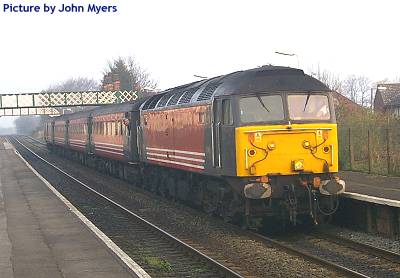
The very last working for the 47-hauled Coast line trains was the early morning Bangor - Manchester 'Club Train' on 31 March 2004, worked by EWS locomotive 47 750. John Myers was up early to ride the train from Rhyl to Flint, and take this picture after a sprint over the bridge.
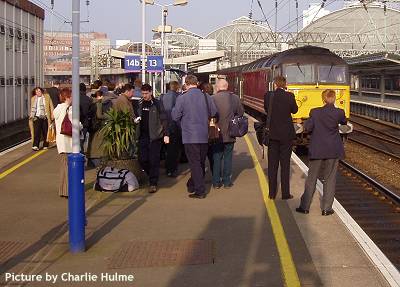
Assembled admirers at Manchester Piccadilly. Some managed a 'seminar shot' for old times' sake. Some Arriva Trains Wales driver training with Class 67s took place in Spring 2004, but in the end it was decided that the 175s could handle the traffic.
Our thanks to all the people whose contributions appear here, and all the rail staff involved with the loco-hauled trains. A special mention to Tim Brawn, a manager with First North Western in those days, whose support for the website and rail enthusiastss in general was a great inspiration.
North Wales Coast home page Archive Previous Notice Board